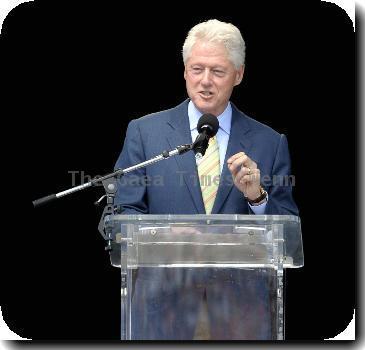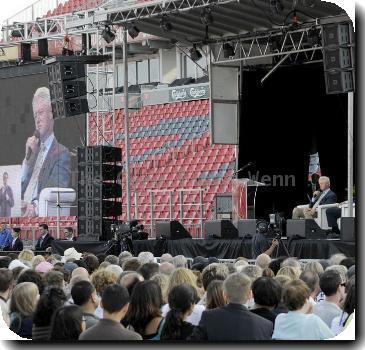Darfur is key for sitting president in Sudan’s weekend elections
By Sarah El Deeb, APSaturday, April 10, 2010
Darfur key for al-Bashir in Sudan elections
EL-FASHER, Sudan — President Omar al-Bashir is pushing hard for a win in war-torn Darfur in Sudan’s key elections this weekend, hoping for a boost in his legitimacy in the face of international war crimes accusations. But he faces a hostile population in a vote observers say is deeply flawed.
Rebels in Darfur have urged a boycott of the three days of voting, which begins Sunday, and many among the 2.5 million refugees driven from their homes by years of war in the western region have not registered to vote. Several parties have pulled out of the race, complaining that al-Bashir’s government has skewed the contest.
Since 2003, this vast arid region has been the scene of a bloody conflict between the Arab-led government in Khartoum and ethnic African rebels. At least 300,000 have been killed and millions driven from their homes in a war that was marked by atrocities by pro-government Arab militias against Darfur villagers.
The landmark elections taking place across Sudan were supposed to go toward healing that conflict — along with the separate north-south war that tore Africa’s largest nation apart for decades.
But in the packed Abou Shouk camp outside the Darfur town of El-Fasher, many refugees see little point in voting. Some said they would have considered voting for the southern candidate for president, but he was among those who dropped out of the race.
“There is a crisis in Darfur. Why should I take part in elections?” said Ali Adam, a 25-year-old vendor who came to the camp seven years ago from his village in northern Darfur. “What can I say? For now, we will pretend we are sleeping.”
“Why should I go vote while rebels are carrying arms for my sake,” said Adam Issac, a 45-year-old resident. “The government brought us here with weapons. I will never vote for them.”
The Brussels-based International Crisis Group warned in a report issued before the elections that an unfair vote in Darfur would likely only fuel rebel movements.
Nevertheless, al-Bashir’s ruling party is campaigning harder here even than in the capital, Khartoum. Campaign rallies were held late into the night Thursday, the last day of campaigning. Hundreds of supporters turned out for speeches from local officials, who promised development and investigation into a recent financial scheme in which many El-Fasher residents lost money.
Election posters line the few paved roads of this regional capital, showing pictures of al-Bashir, the “strong and honest leader,” and inciting voters to choose the “powerful party.” Soldier-filled trucks whiz by on dusty roads, honking and cheering in a show of force before the voting.
A strong showing here for the ruling party would boost al-Bashir’s defiance against the Netherlands-based International Criminal Court, which has charged the president with war crimes over the atrocities in Darfur. It would also allow him to depict himself before the world as a leader who can bring peace to Darfur, where fighting has waned but where a resolution remains elusive.
“This is a regime that is not North Korea or Iran. Despite the rhetoric, there is a craving for international acceptance and legitimacy,” said John Prendergast, a former adviser to President Bill Clinton on Sudan, and co-founder of the Enough project at the Washington-based Center for American Progress.
Darfur is also a prize for al-Bashir in the nationwide elections, which select a president, parliament and provincial legislatures — the first such vote in 24 years. Al-Bashir, who came to power in the 1989 coup, is running in a multiparty race for the first time.
The three states of Darfur account for nearly a quarter of Sudan’s northern population, higher than Khartoum. They could put al-Bashir over the 50-percent margin he needs to avoid a runoff and would help his ruling party secure a majority in the national assembly.
But there are deep concerns over how fair the vote will be. The European Union’s observers mission to Darfur pulled out of the region, saying minimum conditions for firsthand observation were not met. It did not elaborate, but it appeared to be in part in response to emergency laws in effect in Darfur.
Election officials say over 67 percent of Darfur’s 3.6 million eligible voters registered. But opponents say that includes outsiders and a large number of military personnel, who were allowed to register where they are posted.
Furthermore, opponents of al-Bashir, backed by experts and rights groups, say the population census on which the elections are based did not include large areas dominated by government opponents, including rebel-held areas in Darfur.
The problems in Darfur are a microcosm of the ills that plagued the campaign across the country and could deeply undermine the results.
The elections are an essential part of a 2005 peace deal that ended the north-south war that killed 2 million people in 21 years of bloody conflict.
The elections were designed to kick-start a democratic transformation in the war-plagued nation and provide a democratically elected government to oversee preparations for a crucial southern referendum next year, in which southerners will vote on whether to split into an independent state.
But two major political parties, including the southerners, decided to pull out fully or partially from the race, saying the process lacks credibility and elections can’t be held in Darfur while under a state of emergency.
Nevertheless, the election commission said Saturday the voting would go ahead.
“I call upon all the voters … to make every effort to come out and vote,” commission chairman Abel Alier said. “We are committed to free and fair polling.”
The opposition has made a series of complaints — that the National Election Commission is biased to the government, the ruling party has used state resources in the campaign, the number of polling stations nationwide was cut in half from 20,000, making it harder for those in remote villages to cast ballots.
“This is the first time that the party that carried out a coup organizes elections,” said Sarah Nugdallah, the head of the political bureau of the Umma party, a major northern opposition group which is boycotting.
Tags: Africa, Bill Clinton, El-fasher, Khartoum, Middle East, Municipal Governments, North Africa, State Elections, Sudan

